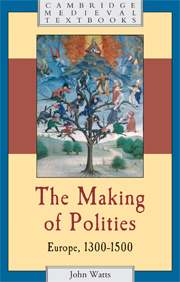1 - Introduction
Published online by Cambridge University Press: 05 June 2012
Summary
This book has two main aims. The first is to write about the later middle ages in language other than the prevailing currencies of ‘waning’, ‘transition’, ‘crisis’ and ‘disorder’. That, perhaps, is pushing at an open door – few of today's late medievalists really see their period in these terms – but, for reasons to be explored below, they continue to be the terms in which textbook literature is written. The second aim, which may be more ambitious, is to provide an analytical account of the politics of the period, explaining what those politics were about, where they came from, and how they developed over time. When we turn to the fourteenth and fifteenth centuries, we enter a period with no meaningful political and constitutional narrative. True, there is a general sense that the nascent kingdoms of the thirteenth century plunged into ‘crisis’ in the fourteenth and entered ‘recovery’ in the later fifteenth. There is also the familiar story of the decline of the universal Church from its zenith under Innocent III to the disaster of 1517. More recently, there is an account of the ‘origins of the modern state’, in which the expanding fiscality of our period plays a central role. And there is Bernard Guenée's perceptive summary, which proposes that the development of royal bureaucracies was thwarted from the 1340s onwards by war, chivalry and democracy, to be resumed in the later fifteenth century when these volatile forces had burned themselves out.
- Type
- Chapter
- Information
- The Making of PolitiesEurope, 1300–1500, pp. 1 - 42Publisher: Cambridge University PressPrint publication year: 2009



